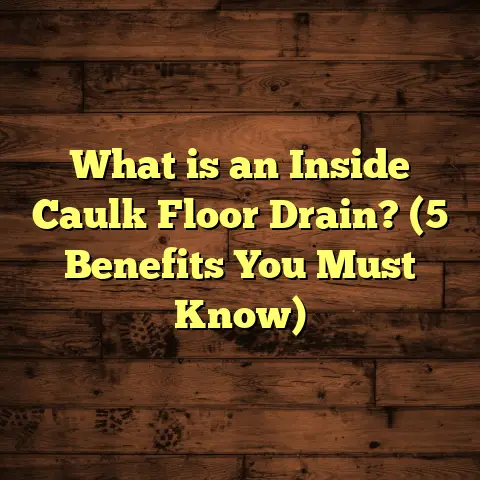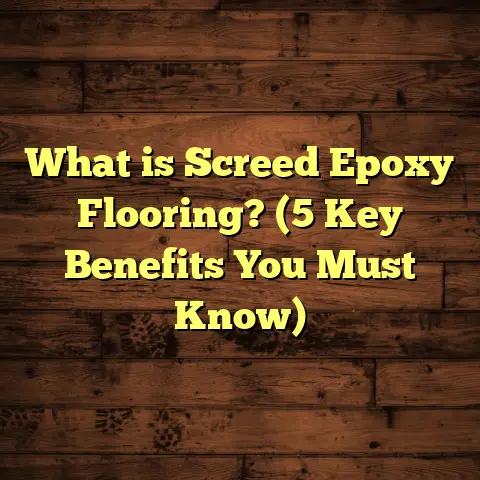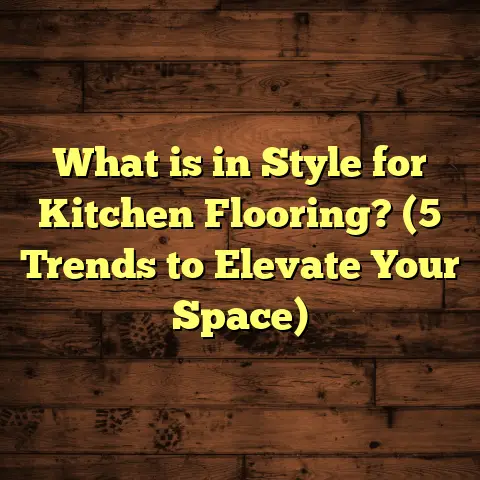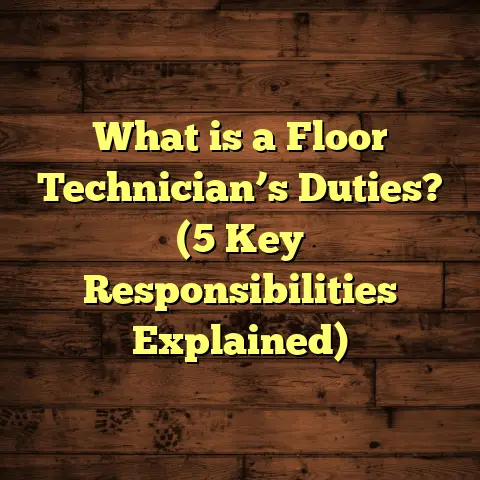What is Vinyl Sheet Flooring? (5 Key Benefits Revealed!)
What is Vinyl Sheet Flooring?
Have you ever walked into a room and been drawn to the floor without quite knowing why? Maybe it’s the smoothness underfoot or the flawless, continuous look that feels inviting. That’s the magic of vinyl sheet flooring. But what exactly is it?
Vinyl sheet flooring is a type of resilient flooring made from synthetic materials, primarily polyvinyl chloride (PVC). Unlike vinyl tiles or planks that come in smaller pieces, vinyl sheet flooring is manufactured in large rolls—usually 6 to 12 feet wide—and installed as one continuous sheet. This creates a smooth, seamless surface that can cover entire rooms without joints.
The structure of vinyl sheet flooring includes multiple layers:
- Backing Layer: Provides stability and acts as a base.
- Core Layer: Adds thickness and durability.
- Design Layer: A printed decorative layer that mimics wood grain, stone, or abstract patterns.
- Wear Layer: A transparent protective coating that guards against scratches, stains, and fading.
- Optional Cushioning Layer: For added softness and sound absorption.
When I first encountered vinyl sheet flooring during a kitchen remodel project, I was amazed by how it combined beauty with practicality. The ability to mimic natural materials while offering resilience was eye-opening. Over time, I’ve learned that this flooring choice offers much more than meets the eye.
1. Durability That Handles Life’s Messes
Durability is one of the biggest selling points of vinyl sheet flooring. You might wonder how a thin sheet can withstand years of foot traffic, spills, and heavy use without showing wear. Here’s what I’ve discovered through experience and research.
Vinyl sheet flooring’s durability comes from its wear layer. This is a clear, tough coating applied on top of the design layer. The thickness of this wear layer typically ranges from 6 mils (0.15 mm) for residential products to 20 mils (0.5 mm) for commercial-grade flooring.
Why does this matter? The thicker the wear layer, the better it resists scratches, dents, and stains.
In a study by the Resilient Floor Covering Institute (RFCI), it was found that commercial vinyl sheet floors with thicker wear layers can last up to 20 years in high-traffic environments like hospitals and schools. Residential-grade floors still offer 10-15 years of reliable performance when maintained properly.
From personal projects, I’ve noticed kitchens and hallways with vinyl sheet floors remain looking fresh after years of activity. Even pets running around don’t cause visible damage easily. This kind of longevity surprised my clients who initially worried about wear and tear.
2. Water Resistance – A Game Changer
If you’ve ever had a water spill that ruined your hardwood or carpet, you know how frustrating it can be. Vinyl sheet flooring is almost completely waterproof because PVC does not absorb moisture.
This water resistance makes vinyl sheet ideal for:
- Kitchens
- Bathrooms
- Laundry rooms
- Basements
According to research conducted by the Tile Council of North America (TCNA), vinyl sheet floors effectively block water penetration for extended periods without warping or delaminating. This is a significant advantage compared to laminate or hardwood floors that swell or buckle when exposed to moisture.
I remember working on a basement renovation where previous owners had water damage issues with carpet and wood floors. Installing vinyl sheet flooring eliminated the worry of future moisture problems. A client later told me how their floor survived a minor flood without needing replacement—something unheard of with traditional flooring types.
3. Seamless Design for Clean Looks and Hygiene
One feature that sets vinyl sheet flooring apart is its seamless installation. Because it comes in wide rolls, installers can lay down one continuous piece covering an entire room or large area with minimal seams.
Why does this matter? Fewer seams mean fewer places for dirt, dust, allergens, and bacteria to accumulate. This characteristic makes vinyl sheet floors popular in:
- Hospitals
- Schools
- Commercial kitchens
- Daycare centers
I have worked on commercial projects where hygiene was a top priority. Clients appreciated how easy it was to keep these floors clean compared to tile with grout lines or carpeted areas. A quick sweep and mop remove most dirt without worrying about grime building up in cracks.
In one daycare case study, replacing worn carpet with commercial-grade vinyl sheet significantly improved sanitation standards while enhancing durability under constant foot traffic.
4. Cost-Effectiveness Without Sacrificing Style
Budget plays a huge role in choosing flooring, and vinyl sheet flooring delivers excellent value for money. It typically costs between $2 to $5 per square foot for materials alone — far less than hardwood ($8–$15 per sq ft) or natural stone ($10–$20 per sq ft).
Installation costs vary but remain reasonable given the speed at which large sheets cover floor areas. Since fewer seams mean less labor time compared to tile or plank installations, overall expenses can be lower.
Despite its affordability, vinyl sheet doesn’t skimp on style. Manufacturers offer an incredible range of designs including:
- Realistic wood grains
- Marble and stone looks
- Abstract patterns
- Solid colors
In several projects I managed for cafés and retail spaces, choosing vinyl sheet allowed clients to achieve upscale aesthetics without busting their budgets.
5. Comfort Underfoot and Easy Maintenance
Comfort matters more than people realize when selecting flooring. Vinyl sheet flooring often comes with cushioned backings or can be installed with additional underlayment to soften the feel underfoot. This makes standing for long periods—like cooking in the kitchen or playing in a kid’s room—more comfortable.
Cleaning is equally simple:
- Sweep regularly
- Mop with mild detergent
- Avoid harsh cleaners or abrasive tools
Unlike hardwood floors that require refinishing or tile grout that demands scrubbing, vinyl sheets maintain their appearance with minimal effort.
A client once told me how her messy kids tracked mud into the house daily but cleaning up was quick and painless thanks to the vinyl sheet floor in their playroom.
How Vinyl Sheet Flooring Compares to Other Flooring Types
Understanding how vinyl sheet stacks up against other common floorings helps make better choices.
| Flooring Type | Water Resistance | Durability | Cost per Sq Ft | Installation Complexity | Comfort Level | Maintenance |
|---|---|---|---|---|---|---|
| Vinyl Sheet | Excellent (waterproof) | High (wear layer dependent) | $2 – $5 | Moderate | Soft/Comfortable | Easy |
| Hardwood | Poor | High (can dent/scratch) | $8 – $15 | High | Medium | Moderate/High |
| Laminate | Poor | Medium | $3 – $7 | Moderate | Hard | Moderate |
| Tile | Excellent | High | $5 – $20 | High | Hard/Cold | Moderate |
| Carpet | Poor | Low | $2 – $6 | Easy | Soft | High |
Vinyl sheet flooring offers a balanced package: affordable cost, high water resistance, durability, comfort, and easy maintenance.
Installation Insights: What You Should Know
When I started installing vinyl sheet floors myself years ago, I realized how important preparation is.
Subfloor Condition: Your subfloor needs to be clean, dry, smooth, and level before laying vinyl sheet flooring. Any bumps or debris can telegraph through the thin material resulting in imperfections.
Adhesive Use: Most vinyl sheets require adhesive application—either full spread glue or double-sided tape depending on product specifications.
Seam Welding: For commercial installations or larger areas where two sheets meet, heat welding seams creates a moisture-tight bond that enhances durability.
Cutting & Fitting: Vinyl sheets can be cut easily with utility knives but require precision especially around corners or irregular shapes.
I recall one project where improper subfloor leveling caused bubbling after installation; fixing it meant pulling up the sheets and re-prepping the floor—lesson learned!
Maintenance Tips That Keep Your Floor Looking New
Taking care of vinyl sheet floors is straightforward but some practices help extend their life:
- Avoid excessive water pooling during mopping.
- Use protective pads under furniture legs.
- Clean spills promptly.
- Avoid abrasive brushes or scrubbers.
- Use manufacturer-recommended cleaners.
- Prevent sharp objects from scratching the surface.
One client reported a spill of red wine that she cleaned up within minutes without staining—a testament to vinyl’s stain resistance.
Real-Life Case Studies
Case Study 1: Family Kitchen Renovation
A homeowner wanted a durable yet stylish floor that could handle kids and pets. They chose a mid-grade vinyl sheet floor with a 12-mil wear layer featuring oak wood grain design. After 5 years, despite heavy traffic and occasional spills, the floor showed minimal wear and remained easy to clean.
Case Study 2: Commercial Daycare Center
Replacing old carpet with commercial-grade vinyl sheet improved hygiene standards dramatically. Staff reported easier clean-up routines and fewer allergy-related complaints from children. The floor maintained its appearance after two years despite constant activity.
Case Study 3: Restaurant Flooring Upgrade
A busy restaurant switched from tile to commercial vinyl sheet flooring due to water resistance and quick installation needs. The seamless floor helped reduce slip hazards and made post-shift cleanup faster.
Environmental Considerations
Concerned about sustainability? Vinyl has had a mixed reputation over the years due to PVC production impacts. However, manufacturers have made strides:
- Offering low-VOC products promoting better indoor air quality.
- Recycling programs turning scrap into new flooring.
- Developing phthalate-free options reducing harmful chemical use.
If eco-friendliness is a priority for you, check product certifications like FloorScore or GREENGUARD before purchasing.
Frequently Asked Questions (FAQs)
Q: Can I install vinyl sheet flooring over existing floors?
A: Yes, as long as the existing floor is smooth and stable (e.g., concrete or plywood). Uneven surfaces should be leveled first.
Q: How long does vinyl sheet flooring last?
A: Typically 10-20 years depending on wear layer thickness and maintenance.
Q: Is it suitable for radiant heating systems?
A: Many vinyl sheets are compatible with radiant heat but check manufacturer specs for temperature limits.
Q: Will vinyl sheet flooring fade in sunlight?
A: Quality products have UV-resistant wear layers minimizing fading over time.
Final Thoughts on Vinyl Sheet Flooring
Vinyl sheet flooring offers a unique combination of durability, water resistance, seamless design, affordability, comfort, and easy maintenance—all wrapped in a stylish package available in countless designs. My personal journey from curiosity to becoming an advocate for this material reflects its practical virtues in real-world settings.
If you’re thinking about upgrading your floors without sacrificing style or budget, give vinyl sheet flooring serious consideration. It’s proven itself time after time across homes and businesses alike.
Got questions about your specific project? I’m here to help! Just ask away anytime.





